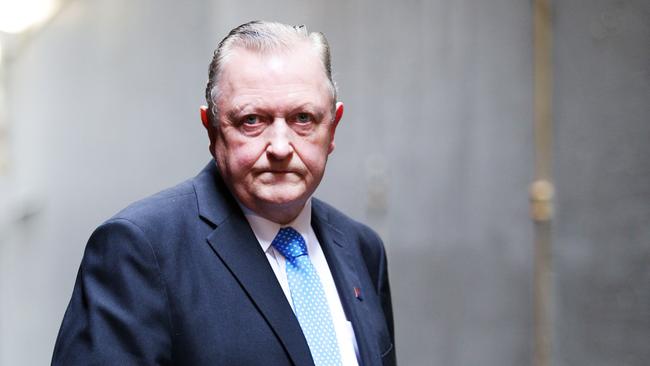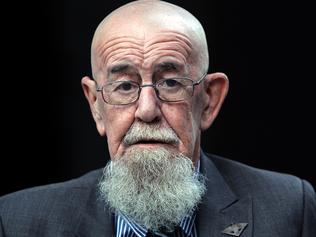Bruce Wilson should face charges: inquiry counsel
FORMER union official Bruce Wilson should face criminal charges over the creation of sham invoices, a royal commission has heard.

JULIA Gillard’s ex-boyfriend, former union official Bruce Wilson, should face criminal charges over the creation of sham invoices that led to hundreds of thousands of dollars being paid into a secret slush fund, a royal commission has heard.
Counsel assisting Jeremy Stoljar SC told the royal commission into union corruption yesterday that Mr Wilson, along with his then Australian Workers’ Union sidekick, the confessed bagman Ralph Blewitt, committed fraud and conspiracy offences that could bring up to 10 years in jail.
Mr Stoljar said it was Mr Wilson’s idea to create a slush fund called the Workplace Reform Association in 1992 for the purpose of issuing false invoices to the Thiess construction company.
Ms Gillard, the former Labor prime minister, was at the time Mr Wilson’s girlfriend and a salaried partner of legal firm Slater & Gordon. She had a role in helping Mr Wilson set up the Workplace Reform Association by providing legal advice, although she insists she did nothing wrong.
The association was meant to provide safety services to Thiess for its Dawesville Channel project near Perth, but Mr Stoljar said it did not engage in any genuine work.
Describing the arrangement as a “mere contrivance”, the commission’s counsel assisting said Mr Wilson had directed Mr Blewitt to send invoices to Thiess “knowing at the time that they were false”.
In a 1995 formal interview with Slater & Gordon’s head partner, Peter Gordon, Ms Gillard admitted that she thought the association was a union “slush fund” for election purposes, but said she had no knowledge of its operations and did not play any role in the fund after providing legal advice to help set it up.
One of the central witnesses in the case, the former AWU vice-president Bob Kernohan, is due to give evidence to the commission today.
Allegations about Ms Gillard’s involvement with Mr Wilson and the AWU slush fund have dogged the former prime minister for almost 20 years. Some critics of the drawn-out saga claim it amounts to a right-wing anti-Gillard conspiracy to unfairly undermine her.
But the royal commission has obtained relevant Victoria Police documents, and is calling witnesses including a respected member of the Fair Work Commission, Ian Cambridge, a longtime legal secretary for Slater & Gordon who worked with Ms Gillard, Olivia Palmer, and a retired builder, Athol James, who has kept quotations, invoices, bank records and notes related to payments for renovations to Ms Gillard’s Melbourne home that figure in investigations.
Ms Gillard did not tell fellow legal partners in 1992 about her role in providing legal advice for Mr Wilson. Nor did she create a file note — the usual practice — when she worked for the AWU as a Slater & Gordon solicitor at the same time. Ms Gillard left Slater & Gordon after her formal interview with Mr Gordon on the matter.
Mr Stoljar told the royal commission yesterday it would be submitted that Mr Wilson and Mr Blewitt had committed offences under sections 558 and 409 of Western Australia’s Criminal Code Act. They included deliberately procuring benefits for themselves.
Evidence had been established that “does not seem controversial”, Mr Stoljar said, that money from the slush fund was used to partly fund the purchase of a house in the Melbourne suburb Fitzroy in Mr Blewitt’s name. Mr Wilson lived in the house when he moved from Perth to Melbourne to head the AWU’s Victorian branch in 1993.
Ms Gillard had no personal financial interest in this Fitzroy property, but she attended the auction with Mr Wilson and was involved in the drafting of a power of attorney document at Slater & Gordon giving him the authority to bid for it. She also arranged the conveyancing work by Slater & Gordon.
Mr Stoljar said evidence further established that money from the Wilson slush fund was also used to pay for renovations on another Melbourne house in Abbotsford owned by Ms Gillard — but he added “there is factual controversy about this”.
As prime minister in 2012, Ms Gillard insisted that she paid for the renovations herself. In her 1995 interview with Mr Gordon, she said she believed she paid for the renovations but could not categorically rule out that money from the fund could have been used.
Last month, Mr Blewitt gave evidence to the commission claiming he handed over at least $7000 from the slush fund to a tradesman at Ms Gillard’s home on the orders of Mr Wilson.
Mr Blewitt claimed Ms Gillard was present in the Abbotsford house at the time, but he said she did not see the transaction occur after she had told him to “just go through” to Mr Wilson and the tradesman in the house’s kitchen veranda area and remained in a front room.
Mr Wilson, who will give evidence to the commission tomorrow, has disputed Mr Blewitt’s account, and stood by Ms Gillard’s position that she paid for her own renovations.
In a statement to the royal commission tendered yesterday, former Slater & Gordon legal secretary Ms Palmer said it was not uncommon to arrange power of attorney documents for specific matters such as the Fitzroy auction.
But Ms Palmer said she did not know then that Mr Wilson was Ms Gillard’s partner when she sought the power of attorney for him. It was “inconsistent with usual practice within the firm” when Ms Gillard became involved in obtaining the Certificate of Currency document for the Fitzroy property shortly before its purchase was finalised, she said.
In evidence at the commission yesterday, Fair Work commissioner Mr Cambridge told how — when he was AWU national secretary — he tried to challenge the legitimacy of Mr Wilson’s slush fund when he discovered it in 1995, and how he tried unsuccessfully to block redundancy payments to Mr Wilson, Mr Blewitt and others when they left the union shortly after.
At the time, Mr Cambridge had recently become the AWU’s national secretary and wanted a full union audit after said he found its accounts in a “mess” following its merger with another union, the Federation of Industrial, Manufacturing & Engineering Employees (FIMEE).
The AWU Workplace Reform Association was started in 1992 with two bank accounts. Payments by Thiess were sent to a secret post box in Perth.
At one point the slush fund “association” held $156,849 in one bank account and $383,332.60 in a cheque account. Regular cash cheque withdrawals were made by Mr Blewitt, with documents showing most cheques were jointly signed by Mr Blewitt and Mr Wilson.
Mr Cambridge said the FIMEE’s Victorian secretary, Bob Smith, had “a lot of tensions” with Mr Wilson.




To join the conversation, please log in. Don't have an account? Register
Join the conversation, you are commenting as Logout